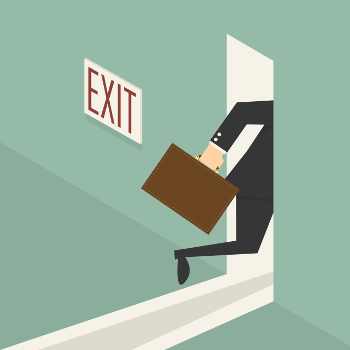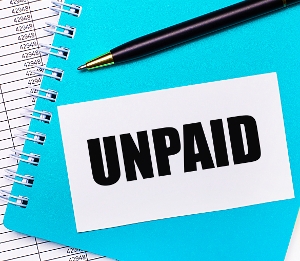Don’t let the door hit you

Let’s start with the news story that triggered this article. A dry cleaner (who will remain nameless) in a U.S. state (that will be similarly anonymous) had customers arrive just before Thanksgiving to find the doors locked and the business gone. No explanation was given, no number to call to get their garments, nothing. It turns out his lease had been cancelled some time before by the landlord, but he’d not said a thing to anybody.
A hero dry cleaner in the same state stepped in and graciously took on all the garments in the store. Many were without tags, jumbled up in bins and therefore difficult to match up to the invoices. He and his staff organized everything they could and notified customers that they could come pick up from him at no charge. Obviously, this guy deserves a medal.
“There were people who were literally crying in the parking lot on Friday because they couldn’t get their clothes,” the hero dry cleaner said. “We did some investigation and found out who the owner of the building was. We contacted him and we offered to help out by taking the clothes that were not able to be given to people. The owner of the business showed up on Friday and I tried to speak with him because we were reaching out to see if his employees needed jobs. He just rushed out of the parking lot.”
The story brought up a delicate issue:
What should you do (or not do) when you must close your doors?
Face facts

Unless there has been a catastrophic loss like a natural disaster, the fact that you are going to have to close your doors is no surprise to you. You’ve gotten further and further behind on the bills. The rent isn’t being paid. Nasty collection letters have arrived. Suppliers have stopped supplying you.
Be an adult and face the inevitable.
Don’t pack a bag and prepare to drive off into the night. Own up to your business failure and do whatever you can to mitigate the damage your closure will bring. Pay what bills you can, take what legal steps you must, and be above board about the whole thing.
Give quality service to the end
The customers left holding the bag (or not holding it, as the case may be) in the opening story of this article had no idea their dry cleaner was going under. They trusted him with their items and expected him to clean them and return them as usual.
If you tell your customers you are going to close, they will immediately stop bringing you things to clean. Wouldn’t you? But at least they will have an orderly procedure for picking up their garments and other items without stress for either of you.

It’s kind of like the combination surge protector and battery backup I have under my desk. If the power goes out, the room goes dark … except for my computer monitor. The battery backup begins to beep obnoxiously, but the computer keeps going.
I know at this point I have up to half an hour to save and close out of the documents I have open, send my in-progress emails, and log out of the computer as normal. I don’t lose data, nor do I have to pick up the pieces after the lights come back on. That’s the purpose of the device.
Closing your doors on your customers as you hit the road is like pulling the plug on a computer when the operator is in the middle of a complicated spreadsheet and hasn’t saved it yet. People have gone ballistic over less.
People need to know
The very first people you should talk to when things get tough are your suppliers and your landlord. See if something can’t be worked out for you to continue operating until things pick up. If that’s a non-starter, then talk to them about an orderly pull out. You will no doubt have equipment that needs to be sold and other items of responsibility to discuss. Enlist legal help as needed.

The next people who need to be on your list are your employees. You want them to work to the end, but they have families and households to think of. They may need to leave before you’re ready to lose them in order to take up new jobs. They deserve the opportunity to do that. Even if you are leaving town, why do you want to leave behind a string of disillusioned and angry workers?
Reach out to another dry cleaner in your area whose work you trust. Talk to him or her about handling any leftover items that need to be held for customers, and see if there are job openings for your employees. This should also be a dry cleaner you recommend your customers patronize in the future. Don’t worry that the other dry cleaner is going to gloat over your misfortune. He or she is going to be sad to see another operator leave the industry. Lean on them for support in your last days in business.
Of course, your customers need to hear of your plans, preferably from you. It would be best if you give your customer service reps and delivery drivers either something to hand the customer or a brief script they can memorize, so the message is both uniform and as upbeat as possible.
Concepts to stress to your customers include:
- Your gratitude for their patronage
- Your sorrow over no longer being able to serve them
- A possible suggestion of where to go for service
- Instructions regarding final pickup of garments and items
If yours is a small community, your local media may get wind of your impending closure. It should be made clear to all that if media representatives call, they should be given the same information, in a warm and positive tone. They’ll report your integrity, rather than something like the story cited here, which concluded by saying the owner hung up on a reporter who called him for a comment.
Go with dignity

When an operator suddenly shuts the doors and leaves a mess behind, it doesn’t just reflect badly on him or her. It is a black eye for the rest of the industry as well. Pull your shoulders back and hold up your head. Leave the business in a responsible and dignified way. There’s a real possibility you are going to be looking for a job yourself before long. Your behaviour in closing your doors should be your best reference moving forward.






